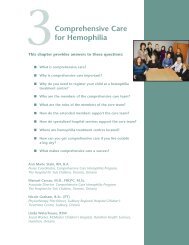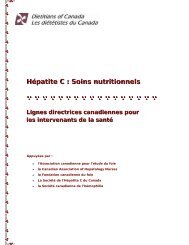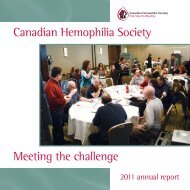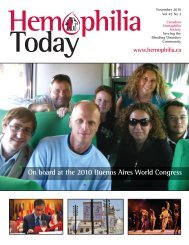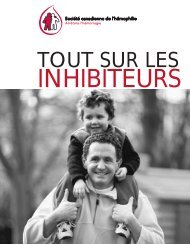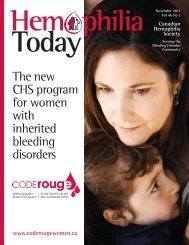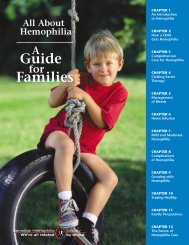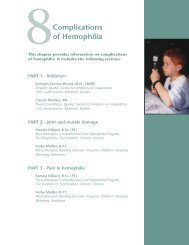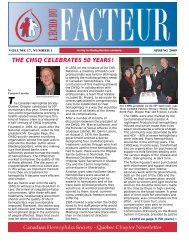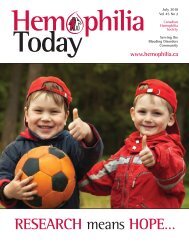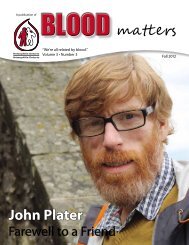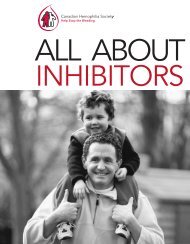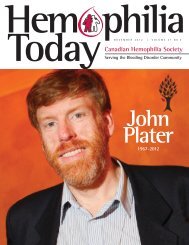BLOOD matters - Société Canadienne de l'Hémophilie
BLOOD matters - Société Canadienne de l'Hémophilie
BLOOD matters - Société Canadienne de l'Hémophilie
Create successful ePaper yourself
Turn your PDF publications into a flip-book with our unique Google optimized e-Paper software.
Hemophilia Ontario<br />
seemingly healthy victim, was the necessity<br />
to keep confi<strong>de</strong>ntial the information<br />
that I was HIV-positive. The<br />
prejudice and hysteria surrounding<br />
this disease was intense, took literally<br />
<strong>de</strong>ca<strong>de</strong>s to subsi<strong>de</strong>, even with the<br />
massive educational efforts by both<br />
governments and NGOs, followed<br />
by legislation concerning the human<br />
rights of HIV sufferers. With all the<br />
work I had put into my education and<br />
career since surviving cancer, there<br />
was no way I was willing to have my<br />
dreams and aspirations si<strong>de</strong>lined by<br />
a bigoted and ignorant public.<br />
More and more was being learned<br />
about the virus by researchers, and<br />
we patients, who were still not sick,<br />
carried on with life, monitoring CD4<br />
levels and viral loads, and watching<br />
the newspaper obituary page for<br />
<strong>de</strong>ath notices of our friends. And<br />
there were many. I was lucky in that<br />
<strong>de</strong>spite astronomical viral counts, my<br />
CD4s stayed in the 300s up until the<br />
presentation to the HIV population,<br />
generally the therapeutic alternative<br />
of AZT. I stayed away from AZT for a<br />
year or so because I was still feeling<br />
very healthy and the si<strong>de</strong> effects of<br />
this potent and toxic medicine were<br />
far from being well un<strong>de</strong>rstood. I<br />
eventually started taking it when I<br />
realized that the key to survival was<br />
getting the viral loads down, reducing<br />
the rate of mutation, which would<br />
eventually yield up a strain that was<br />
able to overcome what was left of<br />
my immune system, and maybe even<br />
drug therapy in the future.<br />
By the early 1990s, with virtually<br />
all of the severe hemophiliacs<br />
infected with HIV, and more than<br />
75 percent of them <strong>de</strong>ad, dying or<br />
showing signs of AIDS-related illnesses,<br />
many professionals in the<br />
field started looking to new areas<br />
in which to practice. It truly seemed<br />
that within a few more years there<br />
wouldn’t be enough hemophiliacs<br />
left to support the clinics. Some giants<br />
in the field, like Dr. Peter Levine,<br />
who was a pioneer in the creation of<br />
comprehensive care clinics for the<br />
treatment of hemophilia, abruptly<br />
Hemophilia—this<br />
special disease whose<br />
treatment is so effective<br />
if it is carried out<br />
expeditiously—has so<br />
much better clinical<br />
outcomes if the education<br />
and support of capable<br />
and <strong>de</strong>dicated nurses ...is<br />
brought to bear.<br />
abandoned their posts when their<br />
clinical patient cohort, their own<br />
lives’ work, were eviscerated by this<br />
horrible “hemophilia holocaust,” as I<br />
call it. At St. Michael’s Hospital clinic<br />
where I was a patient, we were luckier.<br />
Drs. Teitel and Garvey and, most<br />
importantly for me personally, Ann<br />
Harrington, stayed on station, treating,<br />
consoling, commiserating with<br />
and supporting their flocks as they<br />
shepher<strong>de</strong>d them through the fires.<br />
This is how we come to the Bott-<br />
Harrington Fellowship in Nursing. I<br />
feel that there is a need to recharge<br />
the ranks of the nurses specifically<br />
trained in <strong>de</strong>aling with hemophiliacs.<br />
There is a whole new batch of<br />
hemophiliacs born in the past quarter<br />
century who were spared exposure<br />
to the HIV virus. Hemophilia—this<br />
special disease whose treatment is<br />
so effective if it is carried out expeditiously—has<br />
so much better clinical<br />
outcomes if the education and<br />
support of capable and <strong>de</strong>dicated<br />
nurses such as Ann Harrington is<br />
brought to bear. A bleeding disor<strong>de</strong>r<br />
like hemophilia complicates almost<br />
any other illness a patient might fall<br />
prey to. Ann is the kind of nurse<br />
whom we could call at work or at<br />
home at all hours of the day or night<br />
for advice, or to ask to phone ahead<br />
to the ER if we had to go make a visit<br />
there for a hemophilia-related issue<br />
or something completely different.<br />
She was not only competent in the<br />
comportment of her duties, but utterly<br />
<strong>de</strong>dicated to her boys, always<br />
there like a saint or a mother. I am<br />
hopeful that with this fellowship, we<br />
can instil this same set of values in a<br />
new generation of nurses to take care<br />
of a new generation of hemophiliacs.<br />
But there are two names in the<br />
<strong>de</strong>dication of this fellowship. There<br />
are hundreds of stories of tragedy,<br />
heartache and loss in the hemophilia<br />
community in Canada because of<br />
this holocaust that has played itself<br />
out over precisely the past 25 years.<br />
Frank Bott and Denise Orieux represent<br />
just one of those stories, but to<br />
me their story is especially poignant.<br />
They lost both of their hemophiliac<br />
sons—Greg and Martin—to this<br />
damnable scourge. I have known the<br />
Bott family for some 40 years, and<br />
knew Greg and Martin as bright and<br />
likable boys a bit younger than I. The<br />
name Bott is known to most rea<strong>de</strong>rs<br />
of this magazine. Frank Bott its editor,<br />
and both he and Denise have been<br />
tireless advocates for hemophiliacs<br />
since his two boys were born with the<br />
disease, over four <strong>de</strong>ca<strong>de</strong>s ago. Frank<br />
has been the Presi<strong>de</strong>nt of the Canadian<br />
Hemophilia Society, Denise the<br />
Presi<strong>de</strong>nt of the Ontario Chapter, and<br />
both of them have worked as hard<br />
as anybody to lobby government on<br />
policy and research funding issues.<br />
They have directly raised hundreds of<br />
thousands of dollars for hemophilia<br />
research, and they continue their<br />
<strong>de</strong>dicated work to this day, a <strong>de</strong>ca<strong>de</strong><br />
after their beloved boys have passed<br />
away. In my mind they are emblematic<br />
of not only the <strong>de</strong>pth of the tragedy<br />
this community has endured, but its<br />
capacity for forgiveness, <strong>de</strong>termined<br />
strength, and hope for the future, for<br />
a future of good health and fine living<br />
for hemophiliacs who are growing<br />
up now and into the years to come.<br />
As for me, my life of close calls<br />
and fortunate timing continues. It<br />
is an unhappy fact that the woman<br />
I married in 1987 left me in 1994. I<br />
didn’t really know why at the time,<br />
but in retrospect I think it is because<br />
she didn’t want to have children with<br />
6\ Blood Matters Fall 2010



